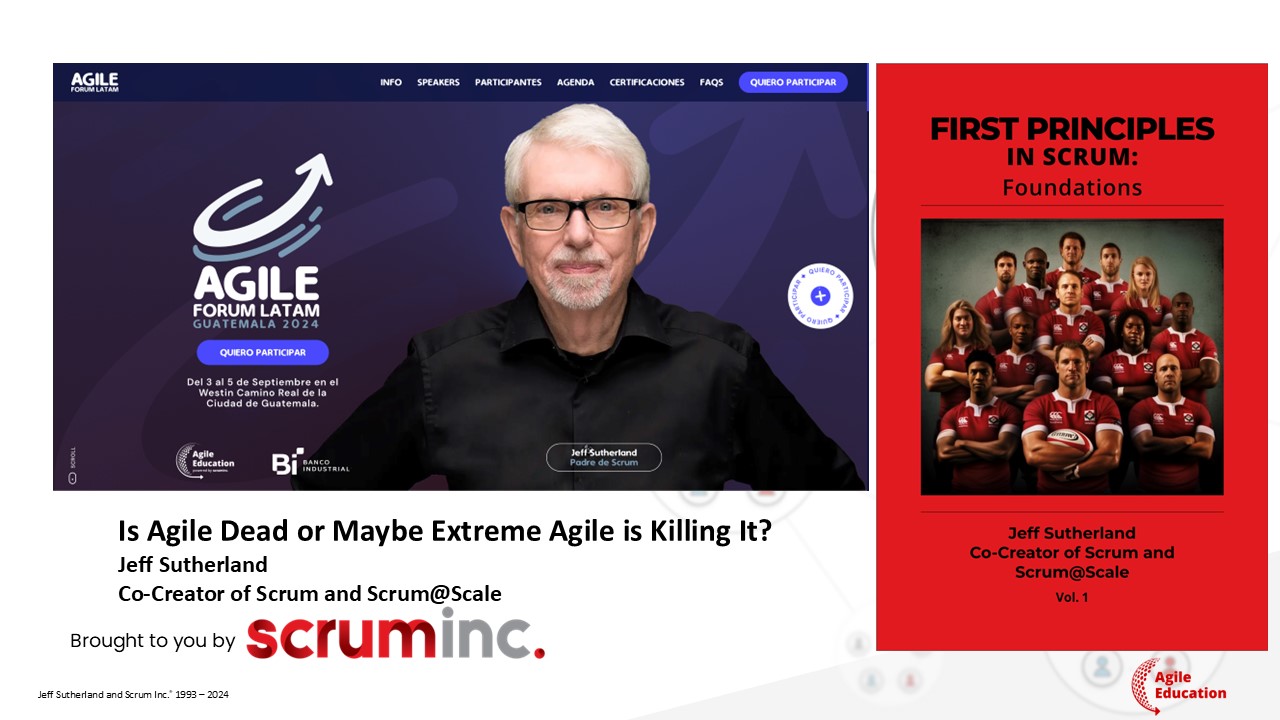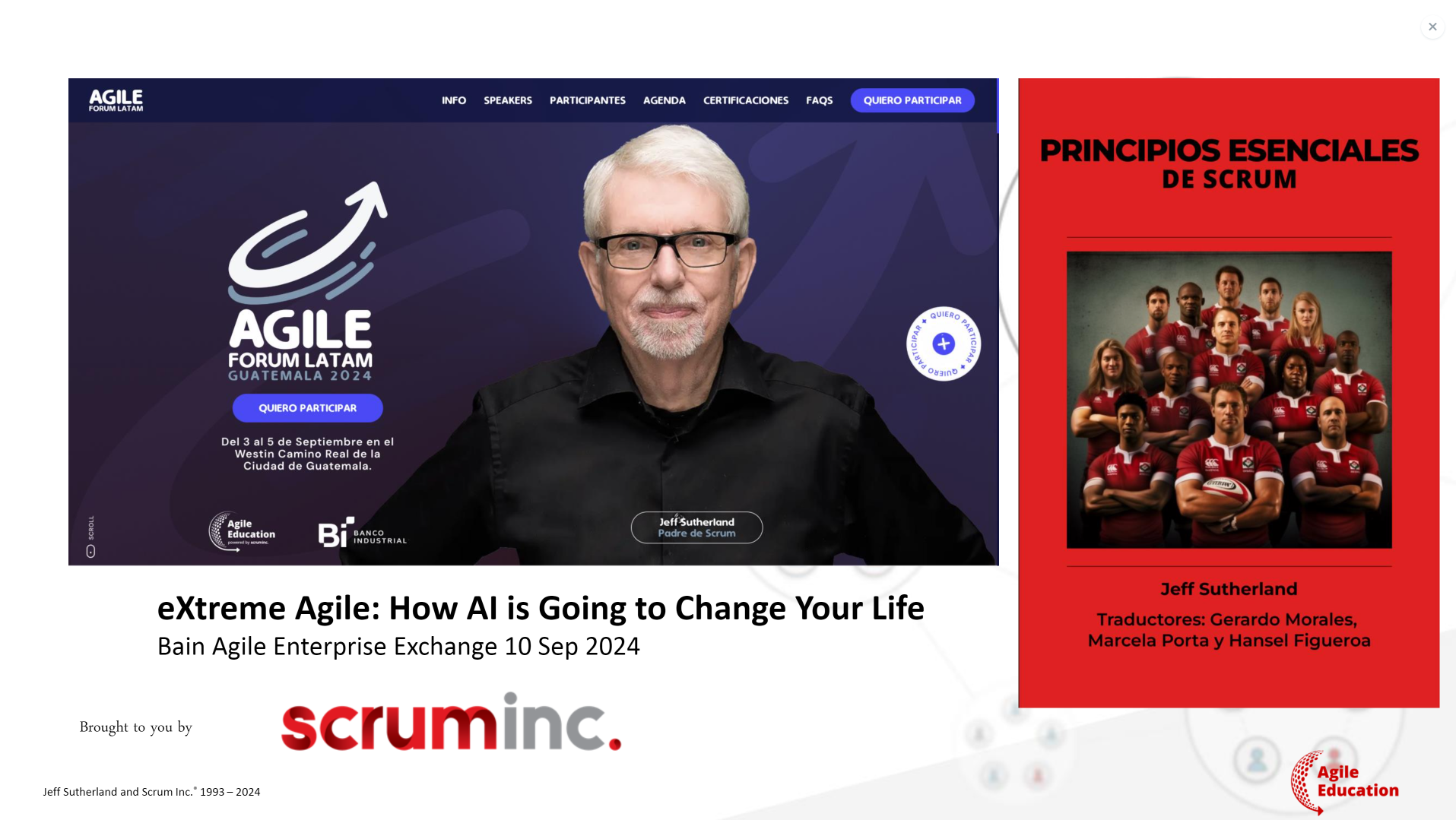Is Agile Dead? How AI and Extreme Agile Redefine Work
The Agile methodology has been the cornerstone of modern software development and team collaboration, but the rapid rise of AI is challenging its very foundation. Dr. Jeff Sutherland, co-creator of Scrum and Scrum@Scale, argues that while Agile is far from dead, the advent of Extreme Agile, driven by AI, is reshaping the framework—and the workforce—beyond recognition.
In his presentation, Is Agile Dead or Maybe Extreme Agile is Killing It?, and accompanying podcast, Dr. Sutherland provides critical insights into how AI accelerates Agile practices and what it means for the future of work.
The Rise of Extreme Agile
AI is revolutionizing Agile by taking productivity to unprecedented levels. Agile teams augmented by AI will become 30–100 times more productive, a transformation poised to reshape industries by 2030. But this acceleration comes at a cost. Traditional Agile roles, particularly in software development, are being replaced as AI proves to be faster, safer, and more reliable.
AI-powered tools like Claude 3.5 and GitHub Copilot are no longer assistants—they are core contributors, performing tasks from code generation to decision-making with unparalleled efficiency. In this new era of Extreme Agile, survival requires adaptation.
The Agile Technology Stack
Dr. Sutherland introduces the concept of the Agile Technology Stack, a multi-layered system that integrates principles from physics, biology, and AI to scale productivity:
- Neuroscience Layer: Enhances team motivation through adaptive feedback loops.
- Scrum Layer: Ensures structured workflows for alignment and focus.
- AI Layer: Automates processes, accelerates workflows, and provides actionable insights.
This integrated stack moves Agile teams beyond traditional methods, enabling them to tackle complex systems at scale while maintaining flexibility.
Post-Labor Economics: A New Workforce Paradigm
AI is not just transforming Agile—it’s redefining work itself. As economic imperatives drive companies to replace labor-based roles with AI-driven systems, Agile frameworks like Scrum and Scrum@Scale become essential for navigating this shift. Dr. Sutherland highlights the importance of transitioning from labor-based to investment-based economic models, where individuals leverage AI to generate and manage value.
For organizations, this means:
- Investing in AI expertise to remain competitive.
- Transitioning to decentralized systems powered by tokenization.
- Empowering teams with tools that merge human creativity and AI efficiency.
Lessons from Industry Leaders
Case studies illustrate how Extreme Agile is already delivering results:
- X.com (formerly Twitter): By reducing staff and integrating AI, the company accelerated delivery cycles and streamlined operations.
- Toyota: Using Scrum@Scale, a stalled project team of 200 was cut to 20, delivering results in just six months.
These examples demonstrate that AI-powered Agile frameworks are not just theoretical—they are actionable and transformative.
Preparing for the Future of Agile
Agile isn’t dead—it’s evolving. Teams that embrace AI as a central component of their workflows will thrive, while those clinging to outdated methods risk obsolescence. By 2030, no Scrum team will be employable without AI integration, and programming as we know it will be replaced by AI-managed systems.
Dr. Sutherland’s presentation underscores the urgency of this transformation. To survive and succeed in the era of Extreme Agile, leaders must act now, embracing AI as an enabler of unprecedented growth.
Contact Dr. Jeff Sutherland
Ready to future-proof your organization? Contact Dr. Jeff Sutherland to learn how Scrum@Scale and AI can drive your transformation. Access the full presentation here and tune into the podcast for deeper insights.
The future of Agile is here. Are you ready to lead the change?



